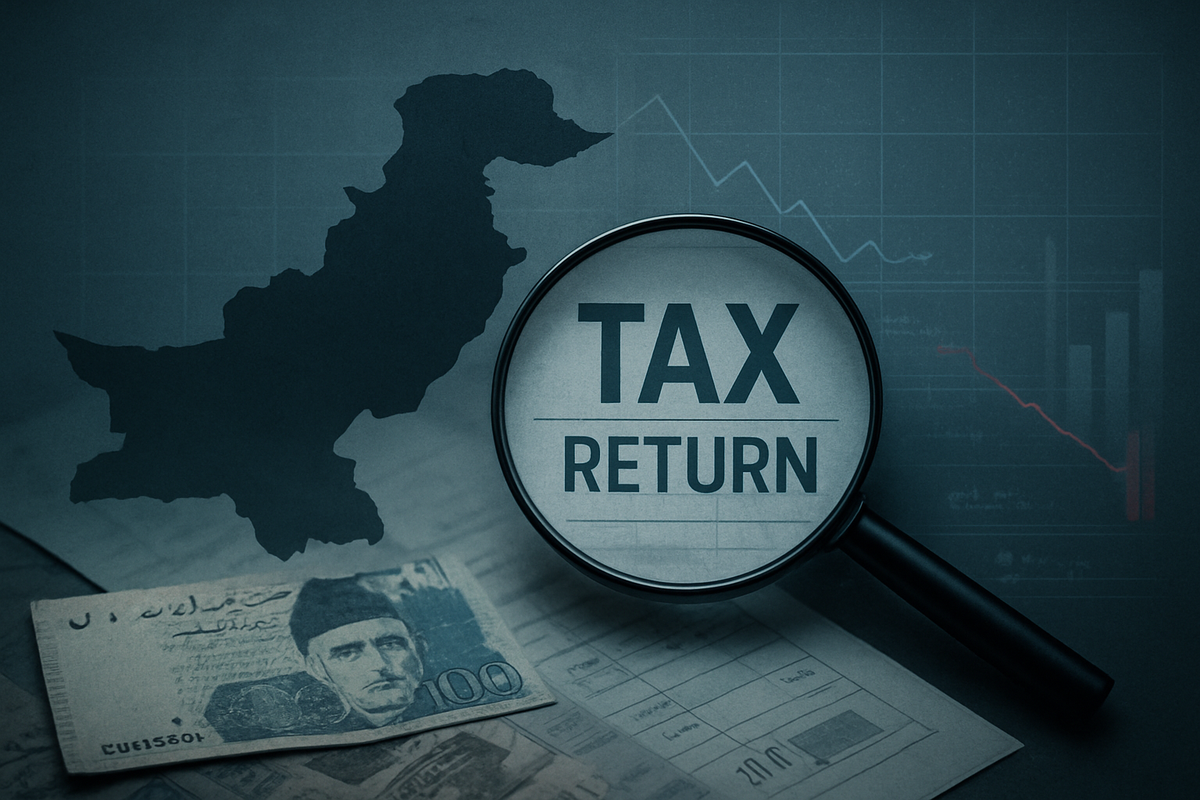
Pakistan's financial landscape is currently embroiled in a significant crisis of transparency, as a staggering surge in 'nil' tax returns casts a long shadow over its ambitious economic reform agenda. As of late October 2025, approximately one-third of all income tax returns filed by Pakistani citizens declare no taxable income, a trend that is severely undermining the nation's efforts to broaden its narrow tax base and achieve fiscal sustainability. This widespread under-reporting not only exacerbates Pakistan's persistent revenue challenges but also jeopardizes its credibility with international financial institutions and foreign investors, demanding aggressive enforcement and structural reforms.
The prevalence of individuals declaring zero income, despite exhibiting lifestyles indicative of substantial wealth, highlights a deep-seated issue of tax evasion and misuse of the self-assessment system. This phenomenon directly impedes the government's capacity to fund essential public services, manage its burgeoning debt, and foster equitable economic growth. The ongoing scrutiny by the Federal Board of Revenue (FBR) and the pressure from global bodies like the International Monetary Fund (IMF) underscore the critical juncture Pakistan faces in reforming its archaic tax system and establishing genuine economic transparency.
Deep Dive into Pakistan's Tax Reporting Crisis
The current fiscal year (2025-2026) has seen approximately 1.7 million out of 5.5 million income tax returns filed in Pakistan declaring "nil" or zero taxable income, a figure that represents nearly one-third of all submissions. This alarming trend mirrors the previous year's data, where almost half of the 5.9 million returns for 2024 also reported no income. Further compounding the issue, close to one million individuals have declared lower incomes this fiscal year compared to the last, with even some exporters claiming losses despite active business operations. This disparity between reported income and apparent wealth, often seen in luxury homes, vehicles, and frequent international travel, points to systemic misreporting and an abuse of the universal self-assessment system.
The timeline leading to this moment has seen consistent challenges in tax collection and compliance. The FBR, the primary tax collection agency, has historically struggled with robust audits, insufficient access to third-party data, and a lack of digitized infrastructure for effective income verification. In response to the escalating crisis, the FBR extended the tax filing deadline to October 31, 2025, while simultaneously intensifying its scrutiny. This move precedes a planned audit drive, for which the FBR has hired 2,000 auditors to detect false declarations. Post-deadline, notices are expected to be issued to individuals declaring lower or 'nil' incomes, offering them a chance to revise their submissions before legal action.
Key players in this unfolding drama include the Federal Board of Revenue (FBR), which is at the forefront of implementing reforms and enforcement. The International Monetary Fund (IMF) and the World Bank are significant stakeholders, consistently urging Pakistan to broaden its tax base as a condition for financial assistance and sustained economic reforms. The Prime Minister's Office has also directly intervened, pushing for "robust changes and deep-rooted reforms," including the digitization of the tax authority and strengthening enforcement against the informal economy. The Federal Tax Ombudsman (FTO) has emerged as a critical oversight body, accusing the FBR and its technical arm, Pakistan Revenue Automation (Private) Limited (PRAL), of maladministration due to persistent technical glitches in the IRIS e-filing system, which further complicates compliance. Initial reactions from the market and industry have been cautious, with concerns over investor confidence and the credibility of Pakistan's economic data being frequently voiced.
Impact on Public Companies and Economic Sectors
The intensified scrutiny over tax returns and the push for greater transparency will inevitably create winners and losers within Pakistan's corporate landscape. Companies that have historically maintained strict tax compliance and transparent reporting stand to gain significantly from a more level playing field. These entities, often larger, publicly listed corporations operating within the formal economy, have borne a disproportionate share of the tax burden. Increased enforcement against tax evaders could reduce unfair competition from informal sector players or less compliant businesses, potentially leading to fairer market conditions and improved profitability for compliant firms. Sectors such as banking, telecommunications, and well-established manufacturing (e.g., Engro Corporation (PSX: ENGRO), Meezan Bank Ltd. (PSX: MEBL)) which typically operate with higher levels of formalization and regulatory oversight, might find themselves in a relatively stronger position as tax evasion becomes harder.
Conversely, businesses that have thrived by operating in the shadow economy or by systematically under-reporting income will face severe challenges. This includes a wide array of small and medium-sized enterprises (SMEs) that have traditionally relied on informal practices, as well as larger entities that may have engaged in aggressive tax avoidance. The FBR's audit drive, coupled with initiatives like mandatory digital invoicing for large retailers and the integration of Point-of-Sale (POS) systems, aims to bring these entities into the tax net. Companies that fail to adapt to these new compliance requirements or continue with opaque financial practices could face hefty penalties, legal action, and significant reputational damage. The increased cost of compliance and the potential for retrospective tax demands could impact their financial viability, potentially leading to business closures or a shift towards greater formalization.
The broader implications for public companies also extend to investor perception. A more transparent and equitable tax system, while initially disruptive, could ultimately enhance Pakistan's appeal as an investment destination. Foreign investors often prioritize regulatory clarity and a predictable tax environment. Therefore, while some companies might face short-term pain, the long-term benefit of a robust and transparent tax system could attract more foreign direct investment, benefiting all legitimate public companies in the long run. However, the transitional period will likely see increased volatility for companies previously benefiting from lax enforcement, while those already adhering to best practices will see their competitive advantage solidify.
Broader Significance and Systemic Reforms
This pervasive issue of 'nil' tax returns and the subsequent governmental crackdown fits squarely into Pakistan's broader, ongoing struggle for fiscal stability and economic reform, often dictated by its engagements with the IMF. The nation's historically narrow tax base and persistent budget deficits have necessitated repeated recourse to international lending, with each program emphasizing the critical need to increase domestic revenue generation. The World Bank, in its October 2025 "Pakistan Development Update," reiterated the urgency for Pakistan to broaden its tax base, underscoring that this is not merely a revenue issue but a fundamental challenge to the country's long-term economic resilience. The government's ambitious tax collection target of Rs. 14.131 trillion for FY26 and the projection for the tax-to-GDP ratio to exceed 15% hinge critically on addressing this widespread under-declaration.
The ripple effects of this tax transparency drive are far-reaching. Internationally, Pakistan's credibility and credit ratings are directly linked to its ability to demonstrate fiscal discipline and transparent economic data. The lack of accurate income declaration fuels doubts about the veracity of official economic figures, including GDP growth claims, and contributes to significant trade data gaps, which can deter foreign direct investment (FDI). For instance, complex and non-transparent taxation has consistently been cited by foreign investors as a key structural bottleneck. Domestically, the disproportionate tax burden on salaried individuals compared to the largely untaxed or under-taxed wealthy elite has fueled public discontent and calls for a more equitable system.
Regulatory and policy implications are extensive. A significant reform is the operationalization of the Tax Policy Office (TPO) in October 2025, an IMF-mandated initiative designed to separate tax policy formulation from revenue collection. This aims to improve revenue-raising capacity, broaden the tax base, and reduce discretionary tax exemptions, which have historically been a source of distortion. Proposals to dramatically increase whistleblower rewards from Rs5 million to Rs150 million are also under review, aiming to incentivize the reporting of hidden assets and tax evasion. Furthermore, the Federal Budget for FY 2025-2026 introduced revised tax slabs and mandated improved digital infrastructure, including the integration of Point-of-Sale (POS) systems with FBR databases and mandatory digital invoicing for large retailers, to enhance compliance. Historically, Pakistan has faced similar challenges with tax evasion, but the current push, driven by both domestic necessity and international pressure, appears to be one of the most comprehensive attempts to date to reform the entire system.
What Comes Next for Pakistan's Tax System
In the short term, the immediate aftermath of the October 31, 2025, tax filing deadline will see the FBR initiating its promised audit drive. This will involve issuing notices to individuals who have declared 'nil' or significantly lower incomes, prompting them to revise their returns. The success of this initial phase will be crucial in setting a precedent and demonstrating the government's resolve. Businesses, particularly those that have been non-compliant, will face a critical choice: either formalize their operations and adhere to tax laws or risk severe penalties. This could lead to a temporary slowdown in some informal sectors as businesses adjust or exit the market.
Long-term possibilities include a more formalized and digitized economy, with increased tax revenue contributing to improved public services and reduced reliance on external borrowing. The continued operationalization of the TPO and the sustained push for digital integration (POS, e-invoicing) are expected to gradually broaden the tax base and enhance transparency. This could lead to a more equitable distribution of the tax burden and foster greater trust between taxpayers and the state. Strategic pivots for businesses will involve investing in robust accounting systems, ensuring full compliance, and potentially exploring new business models that thrive in a transparent regulatory environment. Companies that embrace these changes early could gain a competitive edge.
Market opportunities may emerge in sectors that support digital transformation and compliance, such as financial technology (fintech) and IT services. Increased government revenue could also lead to greater investment in infrastructure and public projects, creating opportunities for construction and related industries. Conversely, challenges will persist for businesses heavily reliant on the informal economy or those unable to adapt to stricter compliance standards. Potential scenarios range from a successful overhaul that significantly boosts Pakistan's fiscal health and international standing, to a more protracted struggle if enforcement falters or political will wanes, leading to continued economic instability and reliance on external aid.
Comprehensive Wrap-up: A Critical Juncture for Pakistan
The surge in 'nil' tax returns represents a critical juncture for Pakistan's economic future, embodying the deep-seated challenges of tax evasion and lack of transparency that have plagued the nation for decades. The government's intensified scrutiny and comprehensive reform efforts, backed by international partners like the IMF and World Bank, are not merely about revenue collection but about fundamentally reshaping the country's economic fabric towards greater fairness and accountability. The immediate implications include heightened pressure on non-compliant businesses and a significant test of the FBR's enforcement capabilities.
Moving forward, the market will be closely watching the effectiveness of the FBR's audit drive and the sustained implementation of the new regulatory frameworks, including the TPO and digital integration initiatives. While the transition may be turbulent for some sectors, a successful overhaul promises a more stable and attractive investment climate for legitimate businesses and foreign capital. The long-term significance of these reforms lies in their potential to create a more equitable tax system, reduce the shadow economy, and foster genuine economic transparency, thereby enhancing Pakistan's self-reliance and global economic standing.
Investors should closely monitor key indicators such as the FBR's actual revenue collection figures in the coming months, the progress of the audit drive, and any further policy announcements regarding tax reforms. The political will to sustain these reforms against potential resistance will also be a crucial factor. Ultimately, Pakistan's ability to tackle this issue head-on will determine its trajectory towards fiscal health and a more transparent, predictable, and prosperous economic future.
This content is intended for informational purposes only and is not financial advice





